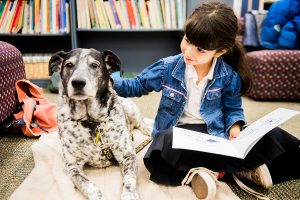Can a dog teach a child to read? Kelly Logan Gould thinks so. Not just any dog can do it, but a Karma Dog can. Gould founded the volunteer-run organization Karma Dogs 11 years ago, shortly after she and her husband adopted a blind puppy, Ernie, who had been rescued from Katrina-ravaged New Orleans.
 “He was basically feral when we got him. He’d jump up on tables. He’s a 50-pound dog, so he was not a good table dog,” Gould remembers.
“He was basically feral when we got him. He’d jump up on tables. He’s a 50-pound dog, so he was not a good table dog,” Gould remembers.
But Gould noticed Ernie’s presence provoked a change in their other dog, Dirk, a fellow rescue. “We watched Dirk take care of Ernie, and guide him,” she says. Marveling at Dirk’s seemingly natural inclination to help, Kelly thought maybe there were other ways this caring dog could assist.
Karma Dogs sprung from this idea. Gould set two overarching goals: To promote rescue companion animals and to help kids who need educational and emotional help. “While [groups such as Pets on Wheels] do visitations, Karma Dogs focuses on therapy programs,” Gould explains.
Currently, Karma Dogs’ biggest program is H.E.A.R.T.S, which stands for Help Encourage All Readers To Succeed. The Karma Dogs now regularly visit the Pikesville Library, the Park Heights Jewish Community Center, Sheppard Pratt, and Cedarmere Elementary School. In addition to helping kids read, the dogs work with kids who have disabilities and emotional issues. Thirty dogs currently work with the program and their owners can sign them up online for an event.
Every third Monday of the month, three or four Karma Dogs can be found at the Pikesville Library. Kids are invited to read a story to the dogs, which Gould says, “takes pressure off the child. Instead of being a student, they become a teacher.” Karma Dogs aren’t judging them, Gould says, and the kids know it.
“Even most the well-intentioned parent can throw off signals,” she says. “Whether the child is reading perfectly or it’s not going well, the dogs give unconditional love. If a child gets stuck on a word, the dog’s human companion will consult with the dog, and say something like, ‘The dog thinks the word is this,’” she says.
In addition inviting kids to read to them, the Karma Dogs ask the children to sign an Oath of Kindness. Gould added the oath several years ago after a group of children in Baltimore set a stray dog on fire. The pit bull, posthumously named “Phoenix” by local animal advocacy groups, inspired Gould to “help kids and parents with empathy. We ask kids to raise their hand and pledge to be nice to animals and tell an adult if you see a friend not being nice. Then the dog ‘PAWtographs’ the certificate,” Gould says. This involves dipping the dog’s paw in washable ink, then pressing his foot to the paper.
The Right Stuff
Five active Karma Dogs brought their owners to speak with Baltimore’s Child about their superhero alter egos. Over the course of a one-hour chat outside Belvedere Square Market, none of the five dogs barked, whined, pulled on their leads or jumped up on the many passersby who stopped to pet them. The dogs sat quietly next to their owners and happily accepted greetings, pats and hugs.
Kathy Corrigan and her dog Silly Puddy have worked in the Karma Dogs program for over eight years. “Silly Puddy works with children on the autistic spectrum, some of whom are nonverbal,” Corrigan says. She’s seen the difference a dog can make: “I’ve heard a nonverbal child say my dog’s name.” Parents tell Corrigan their child is reading more because of Silly Puddy.
Before Corrigan adopted Silly Puddy, she had three dogs who “didn’t qualify” for Karma Dogs. “Teaching obedience is one thing,” she says, “But the dog also needs the right personality” to be a Karma Dog. Corrigan says applicants must own their dogs for at least a year before they can ask for an evaluation. “For the evaluation, dogs are introduced to loud sounds, wheelchairs and different types of people. They have to be able to be away from their owner without whining or barking,” Corrigan says. The dogs have to demonstrate they can “roll with the punches.”
Only about one out of every 10 applicants pass Karma Dogs’ rigorous evaluation. “We’re asking them to not act like normal dogs,” Gould says. “They can’t bark or play or pick things up off the floor. Some dogs just thrive under these circumstances,” Gould says. But not many. Even her own dogs didn’t pass the test.
And it’s hard work for the dogs, Corrigan says. When her dog returns home, “he’s exhausted. He’s been on his best behavior. He’s been responsive, yet calm.”
Judi Fishman’s dog Bentley is one of the newest Karma Dogs. Six-year-old Bentley has been in the program for 14 months and is also involved with involved in Pets on Wheels. Bentley is Fishman’s third Karma Dog.
Bentley is active. “He barks and runs,” Fishman says. “He just knows to not do it in the library.”
Real Reading Results
Suzie Levin has taken time off work to volunteer with Karma Dogs. She has a regular tote bag she brings to the library and her dog Moo Shu gets excited when he sees it. “I’ve seen children come out of their shell. One week you ask them if they want to read to a dog, and they’ll say no. Next month, they’re reading to Moo Shu.”
JoAnn Hatch says she’s seen the program’s impact reach even further. “The staff responds to us as well,” Hatch says. She and her rescue pug Poppy have been active Karma Dog volunteers for five years, since they moved to Baltimore from Texas. “We went to Towson University for exam week,” Hatch remembers. Not only did the dogs “reduce stress” for the students they encountered, the dogs’ presence “changes the whole dynamic of a place.”








